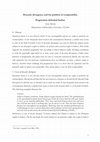Drafts by Anne Meylan
This paper investigates the relation (if any) between my ignoring a fact and my ignorance of it. ... more This paper investigates the relation (if any) between my ignoring a fact and my ignorance of it. Does my ignoring, say, that my remarks are hurting her feelings hold any tight, necessary, relation with my being ignorant of this fact? This question has some interesting repercussion for a recent discussion between El Kassar (2018) and Peels (2019) regarding how to accommodate two apparently incompatible conceptions of "ignorance"-the stative and the agential conception of ignorance-that are both present in the philosophical literature.
Papers in English by Anne Meylan
In L. Oliveira and P. Silva (eds.) Propositional and Doxastic Justification, New York, Routledge. , 2021
Philosophers traditionally distinguish between having justification for believing a certain propo... more Philosophers traditionally distinguish between having justification for believing a certain proposition and believing this proposition with justification (Silva and Oliveira, forthcoming). They call the former propositional justification and the latter doxastic justification. The relevance of this distinction is beyond doubt. The difficulty arises when we attempt to describe how these two notions are related. This paper suggests a new way of understanding this relation.
To appear in: K. McCain and S. Stapleford, Epistemic Duties: New Arguments, New Angles, New York, Routledge University Press.
1. The evidential ought: instrumentalism vs. intrinsicalism.

To appear in: Philosophy and Phenomenological Research
Situations where it is not obvious which of two incompatible actions we ought to perform are comm... more Situations where it is not obvious which of two incompatible actions we ought to perform are commonplace. As has frequently been noted in the contemporary literature, a similar issue seems to arise in the field of beliefs. Cases of doxastic divergence are cases in which the subject seems subject to two divergent oughts to believe: an epistemic and a practical ought to believe. This article supports the moderate pragmatist view according to which subjects ought, all things considered, to hold the practically right belief in, at least, some cases of doxastic divergence. Unlike many defences of pragmatism, this paper does not aim to overcome exclusivism (briefly, the view that only epistemic, but not practical, considerations have an influence on what a subject ought to believe). Another major challenge that pragmatism faces is to show that the epistemic and the practical ought to believe are comparable. This article makes a case for their comparability.
To appear in: Grazer Philosophische Studien
It is commonly accepted-not only in the philosophical literature but also in daily life-that ign... more It is commonly accepted-not only in the philosophical literature but also in daily life-that ignorance is a failure of some sort. As a result, a desideratum of any ontological account of ignorance is that it must be able to explain why there is something wrong with being ignorant of a true proposition. This paper shows two things. First, two influential accounts of ignorance-the Knowledge Account and the True Belief Account-do not satisfy this requirement. They fail to provide a satisfying normative account of the badness of ignorance. Second, I suggest an alternative explanation of what makes ignorance a bad cognitive state. In a nutshell, ignorance is bad because it is the manifestation of a vice, namely, of what Cassam calls "epistemic insouciance".
To appear in: Brill Studies of Scepticism, Special Issue on “Non-Evidentialist Epistemology”, 2019
That we have practical reasons to believe certain propositions even if sceptical arguments are co... more That we have practical reasons to believe certain propositions even if sceptical arguments are cogent is nothing new. As Hume puts it, if sceptical principles were steadily accepted, “men would remain in a total lethargy until their miserable lives came to an end through lack of food, drink and shelter.” (Enquiry, 12, 2). This heart-breaking projection fails to move contemporary epistemologists who, for the most part, brush off pragmatist stances on scepticism. In this paper, I argue that the pragmatist stance on scepticism is not necessarily as easily brushed off as some philosophers think.
Erkenntnis, 2018
In several papers (2013, 2014, 2015) Conor McHugh defends the influential view that doxastic resp... more In several papers (2013, 2014, 2015) Conor McHugh defends the influential view that doxastic responsibility, viz. our responsibility for our beliefs, is grounded in a specific form of reasons-responsiveness. The main purpose of this paper is to show that a subject's belief can be responsive to reasons in this specific way without the subject being responsible for her belief. While this specific form of reasons-responsiveness might be necessary, it is not sufficient for doxastic responsibility.
To appear in : "Companion to Virtue Epistemology", Kelp Ch. (ed.), Cambridge University Press.
In: Epistemic Pluralism, Coliva A. and Pedersen N. (eds.), Palgrave Macmillan, 2017
This article argues that “justification” denotes distinct technical properties in contemporary ep... more This article argues that “justification” denotes distinct technical properties in contemporary epistemology. It is structured as follows. Section 1 spells out a distinction between two ways of tackling the traditional question: “what is a justified belief?”. Sections 2 and 3 exploit some of the upshots of section 1 in order to show that classical reliabilism, accessibilism and presumably many other accounts of justification use the predicate “justified” in distinct technical ways. As we shall see, the careful vindication of the latter claim turns out to be a complex matter.

In: "Metaethical Problems in the Epistemic Domain", McHugh C., Way J., Whiting D. (eds.), Oxford, Oxford University Press, 2018
While buck-passing accounts are widely discussed in the literature, there have been surprisingly ... more While buck-passing accounts are widely discussed in the literature, there have been surprisingly few attempts to apply buck-passing analyses to specific normative domains such as aesthetics and epistemology. In particular, there have been very few works which have tried to provide complete and detailed buck-passing analyses of epistemic values and norms. These analyses are, however, both interesting and important. On the one hand, they can bring to the surface the advantages and difficulties of extending the buck-passing account to specific normative spheres, either providing further support for the approach or highlighting substantive difficulties. On the other hand, epistemic buck-passing analyses can be beneficial for normative epistemology, providing new perspectives on traditional epistemological problems, and possibly providing fresh approaches to such problems. This paper aims at partially filling this gap.
Synthese, 2017
On his 60th birthday Pascal Engel was presented with a collection of more than fifty 1 1 papers a... more On his 60th birthday Pascal Engel was presented with a collection of more than fifty 1 1 papers authored by prestigious philosophers that reflected his long career of promotion 2 and development of analytic philosophy in and out of Europe. 1 This special issue brings 3 together a selection of those papers centred on the topics of truth and epistemic norms.

Theoria, 2017
We are occasionally responsible for our beliefs. But is this doxastic responsibility analogous to... more We are occasionally responsible for our beliefs. But is this doxastic responsibility analogous to any non-attitudinal form of responsibility? What I shall call the consequential conception of doxastic responsibility holds that the kind of responsibility that we have for our beliefs is indeed analogous to the kind of responsibility that we have for the consequences of our actions. This article does two things, both with the aim of defending this somewhat unsophisticated but intuitive view of doxastic responsibility. First, it emphasizes the advantage of preserving, as the consequential conception does, the analogy with the non-attitudinal realm, i.e. with the realm of actions and their consequences. Second, this paper regiments the most important objections to the consequential conception and answers them. The upshot is that there are no serious drawbacks to the consequential conception. There is, therefore, no reason not to favour it over accounts of doxastic responsibility that do not preserve the analogy with the non-attitudinal realm (e.g. Hieronymi 2008, 2009; McHugh 2014, 2015).
In: Routledge Handbook of Virtue Epistemology, Battaly H. (ed.), New York, Routledge, 2018
This first part of this chapter presents the virtue-reliabilist’s answer to the classical value p... more This first part of this chapter presents the virtue-reliabilist’s answer to the classical value problems of knowledge. According to this solution, knowledge is a better cognitive state than what falls short of it —viz. mere true and true+Gettierized beliefs—because when a subject knows, she deserves credit for her true belief. The second part of this chapter is devoted to showing that this solution cannot be extended to solve the “new” value problem, that is to say, the problem of explaining why some higher form of knowledge —what Sosa calls full knowledge— is better than some lower form of knowledge, viz. Sosa’s animal knowledge. The basic problem for Sosa is that, when a subject fully knows, it is not necessarily the case that she deserves more credit than when she has animal knowledge.
In: "Knowledge-First: Approaches in Epistemology and Mind", Carter A., Gordon E., Jarvis B. (eds.), Oxford University Press, 2017
The New Evil Demon Problem (NEDP) is probably the most serious objection that the upholders of a ... more The New Evil Demon Problem (NEDP) is probably the most serious objection that the upholders of a knowledge-first epistemology face. The general format of the solution that several of them (Littlejohn 2009, forthcoming; Weatherson 2008; Williamson forthcoming) have given to this problem is as follows: only the good-case beliefs are justified. The norm satisfied by the bad-case beliefs is not the norm of justification. The purpose of this contribution is to buttress this reply by showing that it is in fact supported by the ordinary concept of justification.

Journal of Philosophical Research, 2015
We frequently praise or blame people for what they believe or fail to believe as a result of thei... more We frequently praise or blame people for what they believe or fail to believe as a result of their having investigated some matter thoroughly, or, in the case of blame, for having failed to investigate it or, for carelessly or insufficiently investigating. For instance, physicists who, after years of toil, uncover some unknown fact about our universe, are praised for what they come to know, Sometimes, in contrast, we blame and may even despise our friends for being ignorant of certain ecological facts as a result of their refusing to countenance the evidence. The purpose of this paper is to explore what underlies the legitimacy of this practice – the praise or blame of people for what they know or fail to know as a result of investigation or otherwise – namely, the ability to exercise control over one’s doxastic states, and, in particular, as I will argue, one’s ability to exercise indirect generic control over one’s doxastic states.
Philosophical Papers, 2012
This article raises a worry concerning Sosa’s way of solving the problem of epistemic circularity... more This article raises a worry concerning Sosa’s way of solving the problem of epistemic circularity. Sosa’s solution to the problem of epistemic circularity relies on the following claim of sufficiency: for S to deserve to be credited for his true belief, it is sufficient that his belief is, in a sense to be made clear, ‘apt’. I argue that this solution undersells the notion of credit. I present three kinds of cases in which the attribution of credit to a believer requires more than the possession of apt beliefs and I defend these cases against possible misinterpretations.
Res Philosophica , 2013
The value problem of knowledge is one of the prominent problems that philosophical accounts of kn... more The value problem of knowledge is one of the prominent problems that philosophical accounts of knowledge are expected to solve. According to the credit solution, a well-known solution to this problem, knowl- edge is more valuable than mere true belief because the former is creditable to a subject’s cognitive competence. But what is “credit value”? How does it connect to the al- ready existing distinctions between values? The purpose of the present paper is to answer these questions. Its most im- portant conclusion is that credit value is not—contrary to what the upholders of the credit solution have frequently claimed—final value.
Philosophical Inquiries, 2014
The general aim of this article is to consider whether various affective phe- nomena – feelings l... more The general aim of this article is to consider whether various affective phe- nomena – feelings like the feeling of knowing, of familiarity, of certainty, etc., but also phenomena like curiosity, interest, surprise and trust – which have been labelled “epis- temic emotions” in fact constitute a uni ed kind, i.e., the kind of the so-called “epistemic emotions”. Obviously, for an affective phenomenon to belong to the kind of the epistemic emotions, it has to meet two conditions: it has to qualify, rst, as an emotion, and, second, as an epistemic one. The paper is structured accordingly. The rst part is devoted to the question whether the aforementioned affective phenomena really are emotions, while the second part bears on their hypothetical common epistemicity.











Uploads
Drafts by Anne Meylan
Papers in English by Anne Meylan
Cet article est consacré à deux problèmes auxquels est confronté le partisan de la théorie perceptuelle des émotions, c’est-à-dire, de la théorie selon laquelle les émotions constituent un type spécifique d’expériences perceptuelles. Ce sont les problèmes de la justification et de la rationalité des émotions. Loin d’ignorer ces difficultés, Tappolet y consacre une partie de son premier chapitre (pages 31-45).
Cette contribution a plus précisément deux objectifs. Le premier est de montrer pourquoi la justification ne pose pas un problème aussi sérieux que la rationalité à la théorie perceptuelle des émotions. Son second but est d’expliquer pourquoi je doute que la solution de Tappolet au problème de la rationalité fonctionne.
Le plan est le suivant. La première partie de ce chapitre est consacrée à distinguer les croyances testimoniales des croyances perceptuelles (section 1. et 1.1). Dans la seconde partie (section 2 à 2.3), nous présentons la réponse réductionniste et la réponse non-réductionniste ainsi que quelques-unes des objections les plus importantes adressées à chacune d’elles. La troisième partie explique pourquoi le prétendu antagonisme entre le réductionnisme et le non-réductionnisme n’en est pas un en exploitant ce que nous appelons « la thèse du malentendu » (3 à 3.2).
L’examen proprement dit des relations qui rattachent ces trois conceptions internalistes de la justification occupe les sections 4 et 5. Les sections 1, 2 et 3 sont des sections introductives. Elles sont, pour leur part, consacrées à la description de ces conceptions.
The first part is dedicated to investigating the affective (module 1) and the epistemic (module 2) nature of the so-called “epistemic emotions” and “epistemic feelings”.
The second part looks at the causal (module 3) and justificatory (module 4) roles that the now accurately delineated epistemic emotions could play in our epistemic activities.
The intended research would rely on studies into particular epistemic emotions or feelings already carried out by psychologists and cognitive scientists and by philosophers writing on emotions general